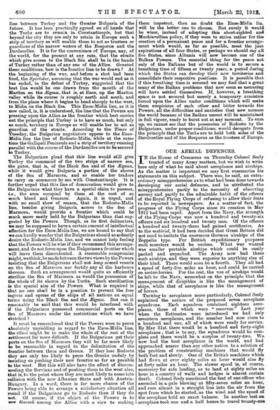THE PROSPECTS OF PEACE. B EFORE we deal with the prospects
of peace we must express our deep regret at the murder of the King of Greece, which took place at Salonica on Tuesday. We do not wish to use the exaggerated language in regard to popular feeling which is often employed on the deaths of kings. Undoubtedly, however, in the present case there will be throughout the world an unusual feeling of sorrow as well as of sympathy for the Greek Royal Family and for the Greek nation. The special circumstances create the sense of pity in a high degree. The King of Greece was not only a man of amiable character, but he had won the respect of the world by the mixture of good sense, tact, and tenacity with which he held fast to one of the most difficult and, as it often seemed, ungrateful tasks that any human being had ever undertaken. The fifty years of his reign were clouded by one difficulty after another, and there were at least a dozen times in his career when the King must have been tempted to abdicate, and might have abdicated without any loss of personal honour or without any man being able to say that he had abandoned his post without due cause. Yet the King of Greece stuck manfully to his job, and in the end earned the reward due to such manfulness. It is not too much to say that at the moment of his death he had become the most popular man in Greece, and that the Hellenic race the world over felt that it owed. him a very great deal. He had contrived to keep the ship of State afloat through endless anxieties and difficulties, and at last a great success and a great triumph had come to the little kingdom.
Whatever may be the final terms of peace, nothing can alter the fact that the Greeks have re-established their national self-respect and their national prestige. To have taken some 80,000 Turks prisoners and some 200 guns, to have captured a place of arms fortified with all the resources of modern warfare—for such was Janina—to have taken the chief islands of the archipelago, and to have held their own at sea, are achievements of which the Greeks have every right to be proud. No doubt it would be absurd to attribute this revival of the Greek spirit as even partly due to the King. The glory belongs to the Greek people themselves. At the same time it is not in the least too much to say that they could never have had the oppor- tunity to do what they have done had not their sovereign prevented, as undoubtedly he did, the dissolution of the nation, and maintained the fabric of government. We feel, then, a genuine emotion when we remember that King George was only able to enjoy for so short a time the gratitude of the Greek people. Happily, by his prowess and good generalship in the field, the Crown Prince, now King Constantine, has won the confidence and respect of his subjects, and is in a. position fully to carry on his father's work. Owing to the events of the last six months it is no untried man, but one who has earned his right to the throne, who succeeds. While dealing with the death of the King of Greece, we must be allowed to express our special sympathy with Queen Alexandra in the blow that has fallen upon her in the death of her brother. The Danish Royal House is one in which the ties of family are particularly close. Though the murder of the King of Greece has caused so poignant a feeling in Europe, there is happily no reason to suppose that it will have any ill effect upon the pro- spects of peace. It was the act of a madman, and no political considerations, either external or internal, are involved in the crime. It will not render either the Allies or the Turks less willing to arrive at a compromise. At the present moment the chief obstacle in the way of peace would appear to be the difficulty of settling the frontier line between Turkey and the Greater Bulgaria of the future. It has been practically agreed on all hands that the Turks are to remain in Constantinople, but that beyond the city they are only to retain in Europe such a strip of territory as will enable them to act as trustees or guardians of the narrow waters of the Bosporus and the Dardanelles. It is for the convenience of Europe, nay, of the world, for the present at any rate, that the straits which give access to the Black Sea shall be in the hands of Turkey rather than of any one of the Allies. Granted these conditions, how is the frontier line to be drawn ? At the beginning of the war, and before a shot had been fired, the Spectator, assuming that the war would end as it has ended, in the defeat of Turkey, suggested that the best line would be one drawn from the mouth of the Maritza on the £gean, that is, at Enos, up the Maritza valley while its course is roughly north and south, and from the place where it begins to bend sharply to the west, to Midia on the Black Sea. This Enos-Midia line, as it is now called, is, it is understood, the line that the Powers are pressing upon the Allies as the frontier which best carries out the principle that Turkey is to have as much, but only as much, territory in Europe as will enable her to act as guardian of the straits. According to the Times of Tuesday, the Bulgarian negotiators oppose to the Enos- Midia line the line of Rodosto-Midia, while at the same time the Gallipoli Peninsula and a strip of territory running parallel with the course of the Dardanelles are to be secured to Turkey.
The Bulgarians plead that this line would still give' Turkey the command of the two strips of narrow sea, the gates, that is, of the Black Sea and of the ./Egean, while it would give Bulgaria a portion of the shores of the Sea of Marmora, and so enable her traders to carry on commerce by sea with Constantinople. It is further urged that this line of demarcation would give to the Bulgarians what they have a special claim to possess, i.e., the area occupied by them at the cost of so much blood and treasure. Again, it is urged, and with no small show of reason, that the Rodosto-Midia line, besides giving Bulgaria access to the Sea of Marmora, would provide a frontier which could be ' much more easily held by the Bulgarians than that sug- gested by the Powers. Though, as its first delineators, we may be supposed to have a certain amount of intellectual affection for the Enos-Midia line, we are bound to say that we can hardly wonder that the Bulgarians should so ardently desire the Rodosto-Midia line, and we cannot help feeling that the Powers will be wise if they recommend this arrange- ment, and do not force upon the Bulgarians a frontier which will leave them discontented. A reasonable compromise might, we think, be made between the two views by the Powers insisting that the Bulgarians shall not keep armed vessels on the Sea of Marmora nor fortify any of the harbours thereon. Such an arrangement would quite as efficiently sterilize the Sea of Marmora, as would the possession of the whole of its shores by the Turks. Such sterilization is the special aim of the Powers. What is required is that no one shall be in a position to prevent the free ingress and egress of the ships of all nations on equal terms using the Black Sea and the lEgean. But can it reasonably be said that this would be interfered with if the Bulgarians possessed commercial ports on the Sea of Marmora under the restrictions which we have sketched ?
It must be remembered that if the Powers were to prove absolutely unyielding in regard to the Enos-Midia line, the effect might be to make the whole of the rest of the settlement far more difficult. If the Bulgarians get their ports on the Sea of Marmora, they will be far more likely to be reasonable in regard to the delimitation of the frontier between them and Greece. If they lose Rodosto they are only too likely to press the Greeks unduly by insisting on pushing their new frontier as far as possible to the west. But this will also have the effect of discom- moding the Servians and of pushing them to the west also, that is, to the point where they are most likely to come into collision with the new Albanian State and with Austria- Hungary. In a word, there is far more chance of the Powers being able to arrange a satisfactory situation all round if the Bulgarians go to Rodosto than if they do not. Of course, if the object of the Powers is to sow discord among the Allies with a view to making them impotent, then no doubt the Enos-Midia lin. will be the better one to choose. But surely it would be wiser, instead of adopting this short-sighted and Machiavellian policy, if they were to strive rather for the creation of a permanent peace and for a frontier arrange- ment which would, as far as possible, meet the just aspirations of all four States, or perhaps we should say all five States, since Albania will now become one of the Balkan Powers. The essential thing for the peace not only of the Balkans but of the world is to secure a breathing time of fifteen or twenty years, a period during which the States can develop their new territories and consolidate their respective positions. It is possible that if this breathing time is secured we may find that a great many of the Balkan problems that now seem so menacing will have settled themselves. If, however, a breathing space is not secured but merely a temporary armistice forced upon the Allies under conditions which will make them suspicious of each other and bitter towards the Powers, all the difficulties and anxieties that now menace the world because of the Balkan unrest will be maintained in full vigour, ready to burst out at any moment. To sum up, we cannot see that the possession of Rodosto by the Bulgarians, under proper conditions, would derogate from the principle that the Turks are to hold both sides of the Dardanelles and of the Bosporus as the trustees of Europe.















































 Previous page
Previous page